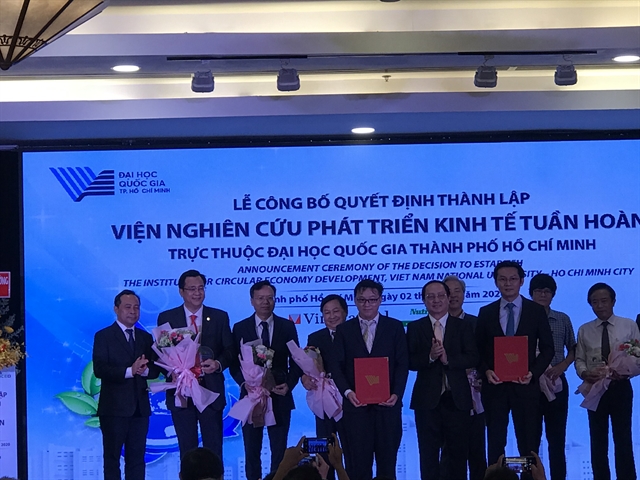 Economy
Economy


|
| The Việt Nam National University-HCM City announces the establishment of the Institute for Circular Economy Development yesterday in HCM City. — VNS Photo Gia Lộc |
HCM CITY — Several business models in Việt Nam are heading towards the circular economy based on the principles of eliminating waste and recycling resources, Nguyễn Thế Chinh, head of the Institute of Strategy and Policy on Natural Resources and Environment, told a conference in HCM City.
The models include recycling villages and eco-industrial parks, he said.
Eco-industrial parks in Ninh Bình Province, Cần Thơ and Đà Nẵng save US$6.5 million a year, he revealed.
But not all waste is reused and recycled and the technologies available for it is outdated, he said.
Nguyễn Tú Anh of the Party Central Committee’s Economic Commission said changing from the traditional to circular economic model is vital for Việt Nam.
The country has seen environmental and water pollution and “The circular economy will help Việt Nam address these challenges.”
A legal framework would be created for circular economic development, but more technologies to aid it would be needed, he said.
The conference was followed by the Việt Nam National University-HCM City announcing the establishment of the Institute for Circular Economy Development to aid change from the traditional economic model.
Assoc Prof Dr Nguyễn Hồng Quân, the institute’s head, said it would recommend policies that could bring economic and social benefits like environmental protection and achieving sustainable development goals based on the proper use of materials and energy.
Assoc Prof Dr Huỳnh Thành Đạt, president of the Việt Nam National University-HCM City, said the institute would advise on methods and policies for the country’s sustainable development, and connect enterprises, the Government and universities. — VNS




